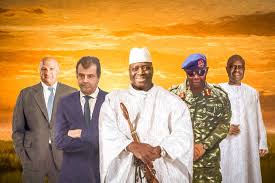Part Two

by Khadija Sharife and Mark Anderson
Timber Rights and the Rare Wood Scheme
Bazzi’s businesses were not the president’s only money-making cabal. Nor was public money the only source of Jammeh’s wealth. During his rule, Gambia exported hundreds of millions of dollars worth of rosewood, an endangered timber not found in its own forests.
Jammeh’s partnership with two Romanians created a monopoly on timber exports that allowed them to grab control of the illegal rosewood trade, according to invoices and court records obtained by OCCRP.
From 2011, the country became a conduit of valuable wood to China, where a ton of rosewood can be sold for as much as $25,000 and high demand can drive the price of a single carved bed frame to $1 million.
Virtually all of Gambia’s exports of rosewood to China came from the forests of Senegal, according to Babacar Salif Gueye, Senegal’s former head of forest management. “All of these logs that Gambia re-exports are illegal,” he wrote in prepared remarks for a 2015 Chatham House meeting. “Ninety-nine percent of all rosewood logs exported to China originate from Senegalese forests, not Gambian.”
Gambia produces little valuable timber, according to the United Nations’ Food and Agriculture Organization. Just 3 percent of the country is densely forested, and much of the wood is “crooked, twisted or otherwise damaged,” the UN body said.
But Jammeh only had to look to the Casamance region of neighboring Senegal to find vast reserves of the valuable wood. The region is home to the Jola ethnic group, of which Jammeh is a member, and the president has strong ties to the region.
The rosewood made its way out of Casamance and into Gambia, and from there it was exported to China, even though Senegalese law prohibits rosewood logging and the trade is closely scrutinized by the Convention on International Trade in Endangered Species of Wild Fauna and Flora.
Along with Jammeh, Senegal’s main rebel group, the Movement of Democratic Forces of Casamance, benefited from the rosewood trade, causing Dakar to classify rosewood as a “conflict timber.” The rebel group is estimated to have earned $19.5 million from the illicit timber trade between 2010 and 2014, according to a report by U.S. environmental charity Forest Trends.
In total, $325.5 million of illegal timber went through Gambia’s ports from 2010 to 2016. The vast majority of that represented valuable timber heading toward China. Most of that was rosewood that had been illegally smuggled into Gambia from Senegal, according to former Senegalese Minister of Ecology Haidar el Ali.
This was the period when Nicolae and Dragos Buzaianu, who appeared to be uncle and nephew, began doing business in the country. The pair appeared to receive significant assistance from the president, who lifted a log export ban the same year the two Romanians received their monopoly on timber exports.
Jammeh and the two men became co-owners of a timber company, WestWood Gambia Ltd. As head of the military and Jammeh’s right-hand man, Badjie would allegedly threaten to send soldiers to arrest anyone who challenged WestWood’s timber monopoly, according to a call received by the treasurer of Gambia’s Forestry Department. Baboucarr Janneh, vice chairman of the Gambia Timber Association, disclosed these threats to the media.
WestWood reported exports of about 5,000 containers of wood in its first six months of operation. The two Buzaianus paid Jammeh $15 million in fees during this period to export timber from Gambia. (They did not respond to multiple requests for comment.)
Trade data from that period shows some $160 million worth of timber was exported to China during their monopoly. The precise type of wood is not declared.
To be continued.
Additional reporting by Attila Biro and Daniela Lepiz.










Recent Comments